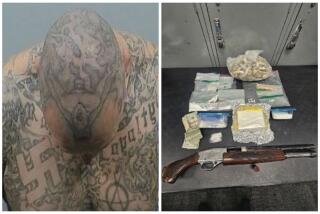Raids in 4 States Target L.A. Gang’s Alleged Drug Ring
Moving aggressively to break up what authorities described as a massive criminal empire being run by veterans of a powerful Watts street gang, FBI agents and police officers in four states arrested dozens of suspects and seized large amounts of cash and drugs Wednesday.
By early Wednesday morning, 11 suspects were in custody in Los Angeles, and scores more were being arrested in Oklahoma City, Minneapolis and Jackson, Miss. All told, federal prosecutors announced the indictments of 49 people, most charged with crack cocaine trafficking and all linked to Los Angeles street gangs.
Nora Manella, the U.S. attorney in Los Angeles, said that 28 of the people arrested are from Southern California and that all the indictments grew out of investigations into Los Angeles street gangs. Although Manella did not identify the gangs, sources close to the case said that many of the suspects--including one who is still at large--are affiliated with the Grape Street Crips, a major Los Angeles gang that has long dominated criminal activity in the Jordan Downs housing project.
“The days when gangs could feel immune from law enforcement are over,” U.S. Atty. Gen. Janet Reno said in a statement from Washington. “We are attacking their organizations from top to bottom and putting them out of business.”
Indictments and complaints unsealed in all four cities--and comments by top law enforcement officials--painted a portrait of a multimillion-dollar crime syndicate using stash houses, storage lockers and couriers for its illegal operations. Cocaine smuggled into the United States from Mexico was routed to Los Angeles, where it was then shipped to cities across the country, said Charlie J. Parsons, the special agent in charge of the FBI’s Los Angeles office.
The organization trafficked in millions of dollars worth of drugs, sending cocaine and crack to cities in the Midwest and South and then shipping back huge sums of cash to Los Angeles, where it was used to buy more drugs from Mexican suppliers, officials said.
“What we’re dealing with here is not a bunch of teenage gangbangers,” Parsons said. “These are entrepreneurs. They’re out to make money.”
Deputy Chief Mark Kroeker, the commanding officer of the Los Angeles Police Department’s South Bureau, added that the arrests reflect the growing influence and sophistication of street gang veterans. As street gang members grow older, some have graduated to more elaborate criminal enterprises, Kroeker said, to the point where some of their operations resemble more traditional organized crime syndicates, which commit a variety of criminal offenses and traffic in huge sums of cash.
Assistant U.S. Atty. Gregory Jessner, a federal prosecutor handling the case, said that in addition to arresting dozens of suspects Wednesday, authorities seized more than $500,000 in cash and confiscated more than 40 kilograms of crack and powder cocaine and five kilograms of amphetamines.
*
Still, the man at the center of the criminal investigation, Wayne Alfred Day, eluded FBI agents. At a morning news conference, authorities released photographs of the 39-year-old Los Angeles resident and asked for the public’s help in spotting him.
Nicknamed “Honcho,” Day has a history of arrests dating back to the 1970s, according to sources and records obtained by The Times. Day’s record includes allegations of assault with a deadly weapon and drug offenses, but authorities said he has never served serious prison time.
In 1987, Day was featured in a television special in which he was identified as a “godfather” of Los Angeles’ street gangs. He was pictured giving instructions to hundreds of gang members on how to perform drive-by shootings.
Parsons said Day, who authorities believe is one of the original leaders of the Grape Street Crips, has escaped punishment in part because he has distanced himself from some of his associates’ illegal activities.
“He’s been a difficult target,” Parsons said. “He’s insulated himself. . . . The message today is that he’s not untouchable. We’re going to reach out and touch him.”
Two federal indictments unsealed Wednesday charge Day with conspiracy to sell cocaine and crack cocaine, with sales of those drugs to a confidential informant, and with trafficking in stolen merchandise--a truckload of electronics gear valued at more than $191,000. A lawyer who has represented Day in previous cases was not available for comment.
The charges against Day could put him behind bars for at least 10 years, but his indictment was just one of several pieces of bad news for his family.
Day’s sister, Bridgette, was among those being sought by the FBI after a grand jury indicted her on drug charges. And his aunt, Janis Floyd, already is in federal custody serving a 10-year sentence for possession with intent to distribute crack cocaine.
Outside their Watts home Wednesday morning, Wayne Day’s parents denied that their son was involved in the drug trade and complained about the FBI’s decision to search their home and to question them about his whereabouts.
“This has got us all shook up,” Betty Day, the suspect’s mother, said as she stood outside her well-maintained Grape Street home, which sits diagonally across the street from a house where her son used to stay. “He is my son, but if he did something wrong, why destroy us? We are his parents.”
Betty Day, who is active in her community and serves as a member of her local police station’s advisory board, said agents arrived at her house shortly after 6 a.m. asking about her son. The police and agents were polite, she said, but neither she nor her husband knew where their son was nor how he could be reached.
Her husband, Arthur Day, said his son at one time was involved with gangs, but he added that he did not know Wayne’s current associates. He said he and his son work together in a family trucking business. Arthur Day said he did not believe that his son was heavily involved in drug trafficking.
*
“If he is a drug kingpin, where is his source of income? Where is the money?” Arthur Day asked. “I’m the one who has to give him money to pay rent and bills.”
Along Grape Street, neighbors stared curiously at the FBI agents during the morning activity. Most declined to discuss the case, but one woman echoed Arthur Day’s skepticism about the charges facing Wayne Day.
“He is a sweet person, he’s not involved in gangs or drugs,” said Brenda Burns, 36. “He wouldn’t start fights, he was the one who tried to stop gang fights.”
As FBI agents expanded their search for Day and his sister, one Watts resident said investigators missed him by just a few hours. At 5:30 a.m. Wednesday, agents called the home of Lisa Josey, Wayne Day’s girlfriend, to say that they had the house surrounded and wanted to search it. They were allowed to search but came up empty.
Willie Josey, Lisa’s father, said Day had been by the house Tuesday evening, bringing food for his daughter. But Josey said he did not know where Wayne Day went after that.
The arrests Wednesday mark the latest developments in a federal crackdown on street gangs and their illegal activities, an operation being undertaken as part of the Justice Department’s renewed emphasis on violent crime. That campaign was launched in 1992 and has intensified in the wake of the Los Angeles riots.
With violent crime a high priority for both federal and local agencies, Wednesday’s news conference announcing the indictments was attended by virtually every top official in Los Angeles law enforcement. In addition to Parsons and Manella, Los Angeles County Sheriff Sherman Block and Los Angeles Drug Enforcement Administration chief Robert Bender hailed the arrests and the interagency cooperation that brought them about.
Los Angeles Police Chief Willie L. Williams was the only top official not representing his agency, with Kroeker standing in for him.
All of the officials stressed that street crime and drug trafficking are national problems, but that their roots are particularly deep in Los Angeles.
“These charges demonstrate that criminal activities of Los Angeles-based street gangs are a national problem,” Manella said. “Narcotics traffickers who cut their teeth on the streets of L.A. are branching out to the South, the Midwest and the Northeast.”
More to Read
Sign up for Essential California
The most important California stories and recommendations in your inbox every morning.
You may occasionally receive promotional content from the Los Angeles Times.











